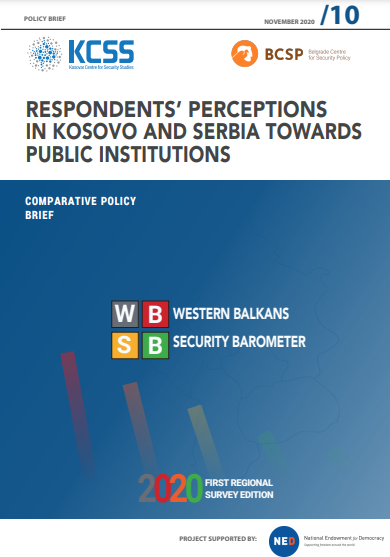14/12/2020

This overview is one of the outputs of the regional project “Western Balkans Security Barometer” (WBSB), led by the Kosovar Centre for Security Studies (KCSS) in partnership with the Belgrade Centre for Security Policy (BCSP) in Serbia. Bearing in mind the complexities and the ongoing political dialogue between Kosovo and Serbia that could potentially lead to resolution, the project was initiated by launching the first regional survey targeting both countries. This edition of the WBSB presents the findings of this survey conducted simultaneously in Kosovo and Serbia in September-October 2020.
This comparative policy brief is intended as an overview of the key findings of both country reports, and serves as a tool to compare Kosovar and Serbian respondents’ perceptions on public institutions.
The key findings in terms of trust, perception of corruption and frequency of contact in public institutions by citizens of both countries respectively, are as follow:
Overall, in Kosovo the security institutions seem to enjoy the highest levels of public trust followed by municipalities while in Serbia it is the central institutions followed by security institutions that resulted the most trusted.
Overall, in Kosovo the security institutions seem to enjoy the highest levels of public trust followed by municipalities while in Serbia it is the central institutions followed by security institutions that resulted the most trusted.
A common pattern that came from responses of the citizens in both countries when it comes to trust is that they both consider the security institutions and in particular the military as among the most trusted. At the same time, they both consider justice institutions as among the least trusted which is key indicator that indicates for a presence of the overspread corruption in the top level of both societies.
Open-ended questions of the survey show that in both countries the number of respondents having no trust at any institution is not lower though – in Serbia with 15 percent compared to Kosovo with 12 percent.
With small differences, similarity in perceptions between respondents in Kosovo and Serbia were noticed also regarding the corruption. In Kosovo, the institutions perceived as most corrupted resulted being the Government, Courts, Prosecution and Customs while the least corrupted ones were considered Kosovo Security Force followed by Kosovo Correctional Services, Kosovo Police and municipalities. In Serbia, the institutions perceived as most corrupted are Prosecution, Courts, Serbian Police, Government and municipalities while the least perceived corrupted have resulted Armed Forces and Correctional Service.
The WBSB survey results also show the low frequency of respondents’ interaction in both countries with only the municipalities and police resulted being the institutions that have frequently contact with their respective citizens.
The views presented in this report are perceptions of the respondents and do not necessarily represent the views of the Kosovar Centre for Security Studies and the Belgrade Centre for Security Policy. Opinions expressed in this report do not necessarily represent the views of the National Endowment for Democracy (NED).